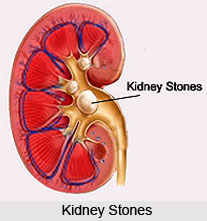 There are many reasons behind the causes of the kidney stones. The formation of these stones depends on various factors like deficiency of some vitamins and minerals, infections, improper drainage functions of some organs, Hyperparathyroidism, imbalance of some salts in urine. Even obesity and heredity are hold responsible for the formation of kidney stones.
There are many reasons behind the causes of the kidney stones. The formation of these stones depends on various factors like deficiency of some vitamins and minerals, infections, improper drainage functions of some organs, Hyperparathyroidism, imbalance of some salts in urine. Even obesity and heredity are hold responsible for the formation of kidney stones.
According to the medical science, there are some etiological factors that are considered to be the causes of kidney stones. Dietetic factors can be hold responsible for the causes of kidney stones like deficiency of vitamin A causes a desquamation of epithelium. A nidus is formed by the cells around which the stone is deposited. In some cases, altered urinary solutes and colloids cause kidney stone. It is contended that an insoluble complex is formed by any reduction of the urinary colloids which absorb solutes or excess of muco-proteins which may chelate calcium. In addition to that the presence of citrate in the urine tends to maintain in solution otherwise relatively insoluble calcium phosphate and carbonate. People having excess levels of vitamin D or who have an overactive parathyroid gland are prone to form kidney stones. Even overindulgence of meat can increase the level of uric acid in blood, which is stated to be one of the reasons of kidney stone formation. Conditions such as gout and treatments like chemotherapy can also increase the risk factors of getting uric acid stones. It has been analysed by the medical research that people who have medical conditions such as cancer, some kidney diseases, or a disease called sarcoidosis are also more likely to develop kidney stones.
Among the variations of kidney stones, some stone formations are related to excess level of ammonia in the urine. This is the result of urinary tract infection (UTI) and the bacteria that cause these infections can generate ammonia.
Renal infection is one of the numerous causes of kidney stones. When the urine is infected with a urea-splitting streptococcus, staphylococcus or proteus, there is a chance of developing clinical as well as experimental stone. Often paraplegia results in skeletal decalcification and increased output of calcium in urine. In combination with this, the mechanical effect of recumbence on renal drainage favors the deposition of calcium phosphate calculi. Even inadequate urinary drainage can cause kidney stones. Though rare, hyperparathyroidism is hold one of the causes of kidney stones. Even Hyperparathyroidism results in a great increase in the elimination of calcium in the urine.
Apart from these minute concentrations (microliths) occurring normally in the renal parenchyma also leads to the formation of kidney stones. In case some of the renal lymphatic vessels are blocked by inflammatory exudates, it results in a sub-endothelial calculus. The endothelium later becomes ulcerated, leaving the calculus in contact with the urine. Metabolic conditions can also be traced as the one of the causes of kidney stones. For instance renal tubular acidosis, Dent`s disease, Crohn`s disease, Hyperparathyroidism and medullary sponge kidney are results of metabolic conditions.
Cystinuria and hyperoxaluria are two inherited metabolic disorders that often results in the formation of kidney stones. The body of the patients with hyperoxaluria, produces too much of the salt oxalate and excess oxalate in the urine form stones. Another most important reason behind the causes of kidney stones is Hypercalciuria. More than half of patients are affected by kidney stones due to this inherited disease. This high level of calcium in the urine causes crystals of calcium oxalate or calcium phosphate to form in the kidneys or urinary tract.
Water fluoridation may increase the risk of kidney stone formation in some cases. Some medical researches testify water fluoridation may increase the risk of kidney stone formation. In one study, patients with symptoms of skeletal fluorosis were 4.6 times as likely to develop kidney stones. Sometimes obesity and heredity are hold responsible for this painful disease called kidney stones. A person with a family history of kidney stones is prone to develop stones. More than 70 percent of people with a rare hereditary disease called renal tubular acidosis develop kidney stones in India. Certain diuretics which are commonly called water pills or calcium-based antacids may increase the risk of forming kidney stones. It increases the amount of calcium in the urine and develops kidney stones.
Apart from these causes of kidney stones, there are some causes which have given rise to major concern as they are responsible in the shaping up kidney stones. According to the recent researches of medical science, global warming can be a cause behind kidney stones. Moreover, diabetes and high blood pressure are also some of the major causes to give rise to kidney stones. Proper care should be taken by balanced diet intake, proper water consumption, and healthy maintenance of hygiene may reduce the risk of kidney stones to some extent.




